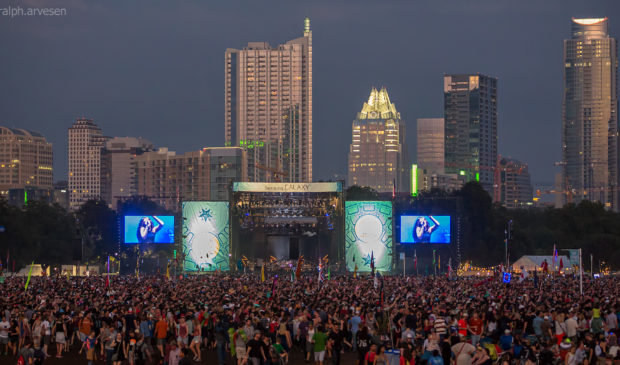Special events could see added fees, scrutiny to lower city’s price tag
Monday, September 12, 2016 by
Chad Swiatecki Organizers of many of the more than 800 special events held in Austin every year are likely to see increased costs and oversight in the years to come, especially for large-scale events that require street closures and place other significant demands on city infrastructure.
A new report from the city’s Financial Services Department, Management Services Department and Corporate Special Events – titled “Alternative Funding Methods for Special Events” – recommends that the city review the cost of providing services for special events. It also recommends post-event evaluations of all special events to determine their cost to the city and their benefit to the community, as ways to reduce or eliminate the cost to the city of the many special events that take place in Austin.
The city’s price tag for providing public safety, planning and other services for special events has regularly exceeded $1 million per year, with a $3.1 million hit in 2013. The cost is derived by calculating the cost of staff time and city resources and subtracting the amount recouped in fees paid by organizers. The shortfall dropped to just under the $1 million mark in 2015 thanks to fee adjustments in some city departments, with $6.8 million recouped on a $7.7 million outlay. But the memo recommends a full review of how much departments spend in time and resources on special events, and a likely increase in charges such as park rental fees to reduce the city’s financial obligation.
Some of the price tag comes from the city’s decision in 2002 to act as a co-sponsor of some events that provide substantial benefits to the city and residents. The 20 events the city co-sponsors – including the Juneteenth parade, Zilker Kite Festival, South By Southwest and the Austin Trailer Food Festival – incur no or very limited fees from the city for the cost of street closures, waste disposal and other city services.
The various fee waivers for co-sponsored events have climbed in recent years, from less than $400,000 in 2010 to more than $1.5 million in 2015. Scrutiny in 2014 of the city’s shortfalls for special events was what first prompted City Council to direct the city manager’s office to begin evaluating how to better fund them.
The resulting report, which was attached to a memo from the city manager’s office to the mayor and Council on Sept. 2, says that staff and the public still support the city having the discretion to co-sponsor some special events, but those decisions could be delegated to a special advisory board rather than City Council itself. Whatever body winds up making those decisions, there is strong support for it to use a matrix of factors to determine an event’s community value. It’s likely that an outside consultant would be contracted to create the matrix, but some suggested criteria include: whether an event is ticketed or open to the public, whether an entrance fee is charged, whether there is restricted access and whether the sponsoring agency is a commercial or nonprofit entity.
The historical, community and commercial benefits of a special event are also potential key considerations. Whatever the decided benefit, another possibility for event organizers is having to participate in a post-event analysis of the total costs they generated to the city, and the event’s benefit and impact on the city. Creating a regular post-event evaluation process would likely help the city keep a closer read on trends in costs and fees, which would allow it to adjust fees and co-sponsorship decisions on an ongoing basis.
Among the steps investigated but either impossible or not likely to be implemented are using Hotel Occupancy Tax revenue to cover the cost of special events – because of statutory prohibitions – and the creation of special event revenue funds for each city department, because of no demonstrable benefit or increased efficiency.
No matter how much the city increases scrutiny of special events, it’s possible that a shortfall of some sort may always remain, in part because there are some community events – such as Halloween and Mardi Gras celebrations – with no central organizing authority to which the city can charge fees. By most estimates, those decentralized gatherings carry an annual cost for street closures and public safety of just over $100,000. Because state law prohibits fees that exceed costs, the city cannot recoup that money by charging higher fees for other events.
Photo by Ralph Arveson made available through a Creative Commons license.
The Austin Monitor’s work is made possible by donations from the community. Though our reporting covers donors from time to time, we are careful to keep business and editorial efforts separate while maintaining transparency. A complete list of donors is available here, and our code of ethics is explained here.
You're a community leader
And we’re honored you look to us for serious, in-depth news. You know a strong community needs local and dedicated watchdog reporting. We’re here for you and that won’t change. Now will you take the powerful next step and support our nonprofit news organization?









